Learn about brain health and nootropics to boost brain function
10 lunches to boost your brain health
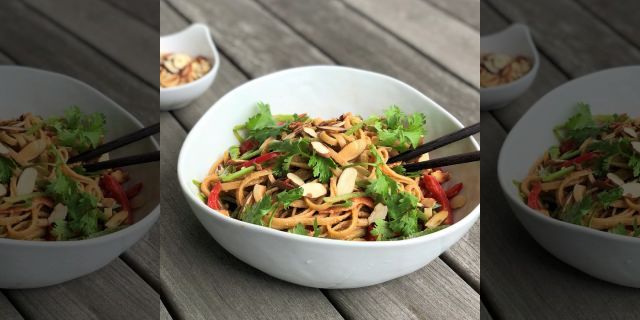
While eating a nutritious lunch is certainly smart for your overall health, did you know that certain foods might directly impact the health of your brain? Salmon, nuts and seeds, avocado, grapes, beans and eggs are just some of the foods with brain-boosting nutrients and antioxidants. To help you get the most brainpower from your mid-day meal, check out these ten tasty lunch recipes from some of the nations top registered dietitian nutritionists.
1) Almond Lover’s Asian-Style Noodle Salad
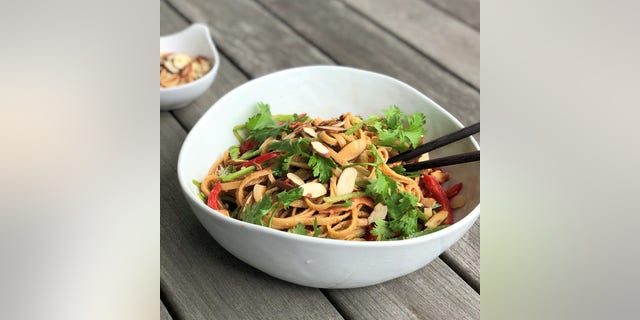
An almond-inspired take on cold peanut noodles, this recipe has almonds in two ways; almond butter is whisked into the sauce for creaminess and toasted sliced almonds are sprinkled on top for bonus crunch. “Combined, the nutty addition gives this bowl a punch of protein, vitamin E and deliciousness. It also has lots of veggies to make it extra nutritious,” says Jackie Newgent, RDN, culinary nutritionist, author of “The All-Natural Diabetes Cookbook.” Almonds, including almond butter, are a top food source of vitamin E, which Newgent says is good news for the brain, since research finds the vitamin may play a role in boosting alertness and memory as well as slowing cognitive decline. “Since the brain is fueled by carbohydrates, pairing almonds in a meal with ‘good’ carbs, like you’ll find in this noodle salad, is food for thought—literally and figuratively,” she says.
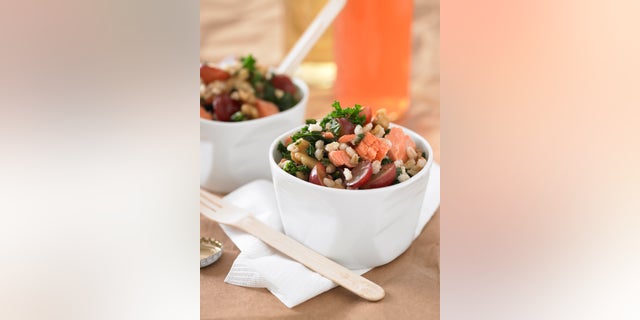
This easy, make-ahead lunch recipe is packed with two powerful ingredients for your brain: grapes and salmon. Grapes are a natural source of beneficial plant compounds called polyphenols, associated with numerous health benefits, including heart and brain health. Polyphenols are found in every part of the grape—the skin, flesh, and seeds—and in grapes of all colors. Naturally sweet, three-quarters of a cup of fresh grapes contains just 90 calories and is an excellent source of vitamin K. Salmon and other fatty fish (such as mackerel, halibut, anchovies and sardines) are rich in omega-3 fatty acids, which research shows are important for cognition (brain memory and performance) and behavioral function. Docosahexaeonic acid (DHA) and eicosapentaenoic acid (EPA), the two types of omega-3s found in fatty fish, are the most important types of fat for brain health. To achieve optimal levels, the Dietary Guidelines recommends two servings of fatty fish per week. The kale, walnuts and barley in this tasty recipe will boost the nutrition content even further.

If you’re in the mood for a salad, this portable meal is as delicious as it is beautiful. “This superfood salad contains eggs, a great source of choline, which is linked to fetal and infant brain development as well as enhanced memory and cognition. Studies have found that this nutrient is especially important during pregnancy for both mom and baby because it helps support healthy brain growth and helps protect against neural tube defects. However, choline is not just important during pregnancy. Research suggests that choline helps with long-term memory, and is important throughout your life,” says Toby Amidor, MS, RD author of “Smart Meal Prep for Beginners.” The seeds, berries and leafy greens in this salad are also loaded with nutrition and antioxidants for a super smart lunch.
4) Salmon Avocado “Tacos”

This brain-boosting recipe combines wild salmon, black beans, avocado, veggies, and fresh herbs and seasonings wrapped taco-style in romaine lettuce leaves. “The essential fatty acid DHA found in wild Alaskan salmon protects brain neurons from injury, reduces cerebral inflammation and helps produce neurotransmitters that communicate with cells. Black beans supply folate, which is essential for brain function, and too little folate can lead to neurological disorders, including depression and cognitive impairment. Avocados score triple points for brain health; their monounsaturated fat and antioxidants help to optimize circulation, which means better blood flow to the brain. Their potassium also helps regulate blood pressure, which is protective, since hypertension is a risk factor for cognitive decline,” says Cynthia Sass, MPH, RD, author of “Slim Down Now: Shed Pounds and Inches With Pulses - The New Superfood.”
5) Kale Fritters
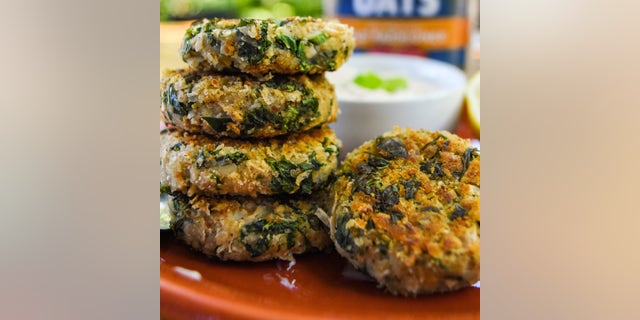
These kale fritters are easy to make in advance and are delicious on top of a salad for a light lunch or as a side dish. “They are brain boosting because they contain oats, kale and beans. Oats are a good source of fiber to help provide lasting brain energy, kale is loaded with brain-protective antioxidants and beans are a staple of the Mediterranean diet, which is an eating pattern associated with better overall brain health,” says Dawn Jackson Blatner, RDN and author of "The Superfood Swap." As an added bonus, instead of throwing away veggies that are about to go bad, Blatner says you can swap the three cups of kale for any veggie in your fridge. To save you time, you can make the fritters in advance and freeze them for up to four months. When ready to eat, simply warm them in a skillet or microwave.
6) Mini Tacos with Avocado, Hummus and Lime

Warm whole-wheat flour tortillas filled with hummus and avocado slices are as tasty as they are easy. Plus, the three main ingredients offer brain-boosting benefits. Grains, both whole and enriched, provide important vitamins and minerals the body needs. Whole grains provide antioxidant and anti-inflammatory nutrients to help protect from diseases associated with aging, including cognitive decline. Avocados provide healthy monounsaturated fat, which contributes to healthy blood flow, and therefore a healthy brain, and beans have been shown to help stabilize blood sugar levels, which is important for cognitive function. Research shows that a Mediterranean-style diet, which includes whole grains, avocados and hummus, helps maintain brain health and may reduce the risk of Alzheimer’s disease. Packed with eight grams of fiber and eight grams of protein per serving, these mini tacos will also help keep you feeling fuller, longer.
7) Italian Flatbread Egg Panini
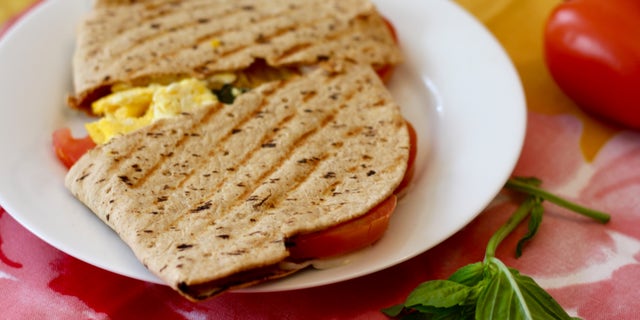
This Italian-style flatbread Panini marries fabulous flavor with quick cooking for a lunch that's ready in no time. It features protein-rich eggs and mozzarella, fiber from flatbread and tomatoes and a burst of fresh flavor from basil. “Who says eggs are just for breakfast? When you eat the whole egg, you get plenty of choline, a nutrient linked with better visual and verbal memory, according to a study by Boston University researchers. We also know that when pregnant women regularly consume choline, their developing children have potential long-term brain-health benefits, per research by scientists in New York,” says Amy Gorin, MS, RDN, owner of Amy Gorin Nutrition in the New York City-area. If you don’t have a Panini press, Gorin says to use a cast-iron grill pan, pressing the lid of a pot on top of each side of the sandwich to form grill marks.
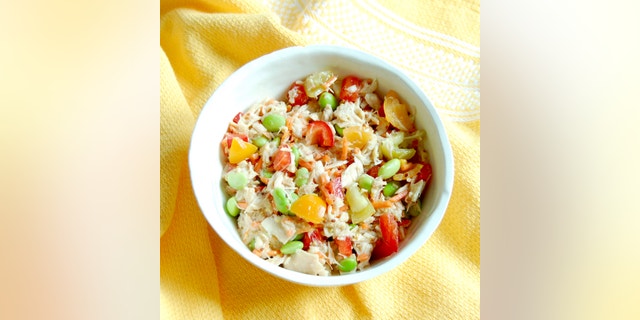
Ready in less than 10 minutes, this easy tuna and edamame salad is a smart lunch recipe for adults and kids alike. “This quick salad is full of brain-boosting ingredients. Seafood has been linked to increased brain functioning, especially fatty fish rich in omega-3s like salmon and tuna. There's also some research that shows soybeans can boost brain function,” says Jessica Levinson, MS, RDN, CDN, culinary nutrition expert and author of the forthcoming “52-Week Meal Planner.” Whole, immature soybeans, edamame has sometimes been referred to as vegetable-like soybeans. A half-cup serving of shelled edamame provides nine grams of fiber, which is the equivalent of four slices of whole-wheat bread, as well as two key antioxidants; vitamins C and A. This mayo-free tuna salad is made with a heart-healthy vinaigrette dressing and packs an added nutritional punch with carrots, bell peppers and cherry tomatoes.
9) Southwestern Vegan Lentil Dip

This simple vegetarian dip can be eaten as is with chopped vegetables or chips, or transformed into a filling for tacos or as a sandwich spread. “The humble lentil shines in this brain-boosting Southwestern dip. This recipe boosts brain health thanks to folate, the B vitamin studied for its ability to improve memory and mood,” says Robin Plotkin, RDN, Culinary Nutritionist and Founder of Robinsbite.com. In addition to folate, lentils also provide vitamin B6 and thiamin, which are important for focus and energy, zinc, which is thought to be a memory booster, and iron, which is important for cognitive functioning in women during childbearing years. This dip also packs in vegetables like tomatoes, carrots, celery and onions, making it a tasty way to meet your veggie quota for the day.
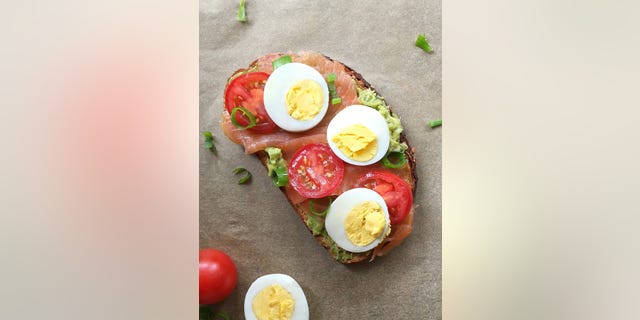
This easy-to-assemble avocado toast is made with smoked salmon, hard-cooked eggs and tomatoes, and offers brain-boosting benefits. “Salmon is rich in omega-3 fatty acids, which studies show are important for brain development in infants and children and may even reduce the risk of depression in adults,” says Liz Weiss, MS, RDN hosts the “Liz’s Healthy Table” podcast and blog. A meta-analysis on fish consumption and depression published in the Journal of Epidemiology and Community Health shows that people who eat seafood regularly are 20 percent less likely to suffer from depression than their non-seafood-eating peers. Eggs also contain choline and lutein, two nutrients important for brain health at all ages.
Click here to view full article